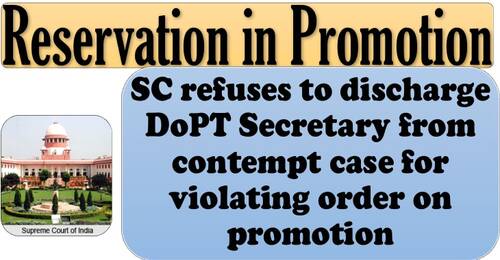Reservation in Promotion: SC refuses to discharge DoPT Secretary from contempt case for violating order on promotion
SC refuses to discharge DoPT Secretary from contempt case for violating order on promotion: Deccan Herald
The Supreme Court on Monday declined to discharge Secretary, Department of Personnel and Training from contempt proceedings for alleged breach of its status quo order on the promotion of Central government employees.
Attorney General K K Venugopal submitted before a bench of Justices L Nageswara Rao and Aniruddha Bose that there was material suppression of facts in the contempt petition as only “temporary and ad hoc promotions” were made.
He said the contemnor, senior IAS officer Ajay Kumar Bhalla should be discharged in light of such facts.
The court, however, refused to accept his plea and put the matter for consideration in the second week of August.
On April 9, the court issued notice to the senior officers of the Union government on the contempt petition filed by Debananda Sahoo against them for violation of the top court’s order of April 15, 2019.
The petitioner led by advocate Kumar Parimal contended that the court had on April 15, 2019, directed for maintaining the status quo as to the promotion of the officers. The DoPT made an application for permission to grant ad-hoc promotion, which was declined on July 22, 2020.
However, the DoPT had on December 11, 2020, issued promotion orders in favour of 149 officers from selection grade (deputy secretary) of the central secretariat service to senior selection grade (director) on an ad-hoc basis. Of this, 55 deputy secretaries belonged to the reserved category and had taken benefit of reservation in promotion and consequential seniority in their career earlier.
“The promotion order was issued without reviewing the select list of undersecretary for the year 2003 and onwards and consequential review of deputy secretary select list of 2003 and onwards in terms of Constitution bench judgements in M Nagaraj and Jarnail Singh,” the plea claimed.
Thus, it is crystal clear that the contemnors have deliberately, willfully and dishonestly disobeyed the order of this court, making them liable for punishment under the Contempt of Courts Act, it contended.
In the Constitution bench decisions of Nagaraj (2006) and Jarnail Singh (2018), the top court had laid down conditionalities like a collection of data on the inadequacy of representation, the overall effect on efficiency on administration and removing creamy layers in considering reservation in promotion.
Read at: Deccan Herald



COMMENTS